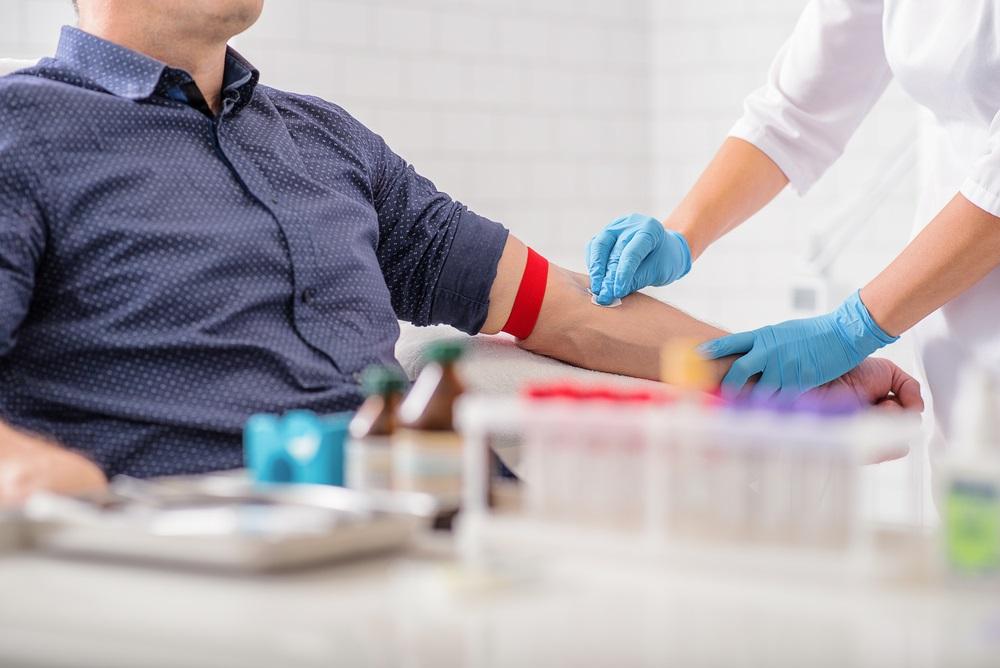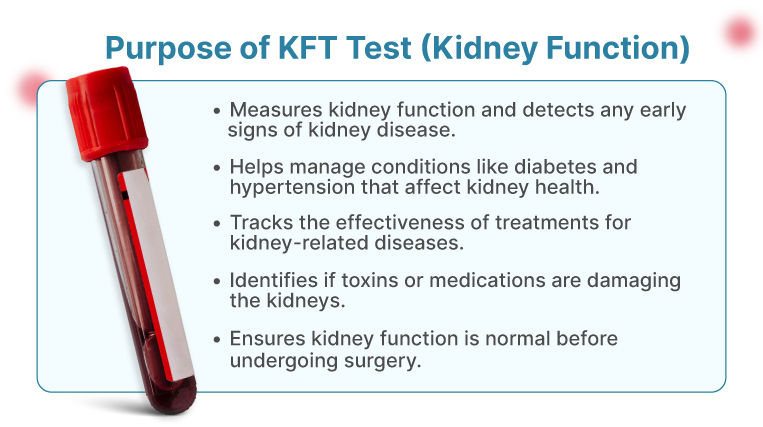Kidney Function Test (KFT): Creatinine, eGFR & Urine Microalbumin (ACR) — Noida Guide

If you’re searching for a kidney test in Noida or a KFT test in Noida, this comprehensive guide is for you. We break down the kidney function test (KFT test) and its key components—the creatinine test, eGFR test, and urine microalbumin or albumin-to-creatinine ratio (ACR test)—so you know exactly what to book, how to prepare, and how to read your report. You’ll also find tips for choosing a reliable pathology lab in Noida, plus the convenience of home sample collection in Noida at an NABL-accredited lab in Noida.
What is a Kidney Function Test (KFT)?
A kidney function test (often listed as KFT test) evaluates how well your kidneys filter waste, balance fluids and electrolytes, and protect your heart. Most KFT panels include:
- Creatinine test (blood)
- eGFR test (calculated from creatinine, age, and sex)
- Urine microalbumin, reported as albumin-to-creatinine ratio (ACR test)
- Often added: urea/BUN, uric acid, sodium, potassium, calcium, phosphate, and sometimes urine routine
Why these tests matter
- Kidney disease is often silent in its early stages: You may feel fine even when damage has begun.
- Early detection prevents progression: Finding urine microalbumin (ACR) early allows timely treatment to slow or stop chronic kidney disease (CKD).
- Heart health link: Abnormal KFT results increase cardiovascular risk—managing them benefits heart and kidney health together.
Deep dive into the key tests
- Creatinine test
- What it measures: Creatinine is a muscle waste product filtered by the kidneys. When filtration slows, blood creatinine rises.
- Typical adult ranges: Many labs flag around 0.6–1.1 mg/dL (women) and 0.7–1.3 mg/dL (men), but always use your lab’s reference.
- Factors that raise creatinine without true kidney damage:
- High muscle mass or bodybuilding
- Dehydration, recent heavy exercise, or large meat/protein meals
- Certain medicines: NSAIDs; trimethoprim and cimetidine (reduce tubular secretion); and creatine supplements
- Factors that may lower creatinine:
- Low muscle mass, frailty, malnutrition
- Lab methods: Enzymatic assays are more specific than Jaffe in some settings. Re-check at the same lab for trend consistency.
- eGFR test
- What it shows: Estimated glomerular filtration rate (mL/min/1.73 m²) is calculated from the creatinine test, your age, and sex (commonly CKD-EPI 2021, without race adjustment).
- CKD staging by eGFR (KDIGO)
- G1: ≥90 (normal/high if no other kidney damage)
- G2: 60–89 (mildly decreased; monitor if persistent)
- G3a: 45–59 (moderately decreased)
- G3b: 30–44 (moderate–severe decrease)
- G4: 15–29 (severely decreased)
- G5: <15 (kidney failure)
- Important cautions
- eGFR assumes stable creatinine; it’s unreliable in acute illness or rapidly changing kidney function.
- Special situations: Very muscular or very underweight body types, amputations, pregnancy, and children—eGFR can be off. Pediatric eGFR uses the Schwartz formula; pregnancy uses serum creatinine and urine protein under obstetric guidance.
- Consider cystatin C: If eGFR is borderline or muscle mass is unusual, a cystatin-based eGFR can help confirm kidney function.
- Urine microalbumin (albumin-to-creatinine ratio, ACR test)
- What it measures: Tiny amounts of albumin in urine—often the earliest sign of damage from diabetes or hypertension.
- Why ACR is preferred: It adjusts for urine concentration, making a spot (single) sample as clinically useful as a 24‑hour collection.
- ACR categories (mg albumin per g creatinine)
- A1: <30 mg/g — normal to mildly increased
- A2: 30–300 mg/g — moderately increased (often called “microalbuminuria”)
- A3: >300 mg/g — severely increased (“macroalbuminuria”)
- When to confirm: If elevated, repeat ACR 2 more times over 3–6 months. Persistent albuminuria = 2 of 3 tests abnormal.
- Temporary false elevations: Urinary tract infection, fever, vigorous exercise, dehydration, and menstruation. If present, delay testing.
- Units note: Some reports use mg/mmol. To approximate mg/g from mg/mmol, multiply by ~8.84.
Who should get a KFT test?
- Diabetes (type 2: at diagnosis; type 1: 5 years after diagnosis), then yearly
- High blood pressure
- Heart disease, obesity, or metabolic syndrome
- Family history of CKD
- Age 60+ with any risk factors
- Long-term NSAID use or exposure to kidney-harming drugs
- Symptoms: ankle/foot swelling, foamy urine, fatigue, reduced urine output, or persistent nausea
How often should you screen?
- Diabetes: annually (eGFR + ACR); more often if abnormal
- Hypertension: annually; increase frequency if albuminuria appears
- Known CKD: often every 3–6 months as advised by your doctor
- Low-risk adults: discuss every 1–2 years after age 40
Preparing for your kidney function test
- Fasting: Not required for the creatinine test, eGFR test, or ACR test
- Hydration: Drink normal amounts of water; avoid dehydration or overhydration
- Food and exercise: Skip intense workouts and very high‑protein meals 24 hours before testing
- Medications and supplements: Tell your doctor/lab about NSAIDs, certain antibiotics, proton pump inhibitors, herbal remedies, or creatine
- Urine sample tips: First‑morning, clean‑catch midstream is ideal for ACR; avoid testing during UTIs or menstruation when possible
Understanding common result patterns
- High creatinine + low eGFR: suggests reduced filtering—repeat, review medicines/dehydration, and consult your doctor
- Normal eGFR but ACR 30–300 mg/g: earliest kidney damage—tighten blood sugar/BP control and recheck
- ACR >300 mg/g: significant protein leakage—needs prompt evaluation and treatment
- eGFR 60–89 with ACR <30 mg/g: often age‑related; watch the trend and manage risk factors
- Sudden changes from your baseline: can occur with dehydration, new drugs, or acute illness—retest after recovery
What to do if your KFT is abnormal
- Recheck to confirm: Many guidelines require persistence (≥3 months) for a CKD diagnosis
- Manage risk factors:
- Blood pressure: target per your clinician; ACE inhibitors/ARBs protect the kidneys in albuminuria
- Diabetes: optimise glucose; SGLT2 inhibitors and, in some cases, finerenone may be considered
- Lifestyle: stop smoking, maintain a healthy weight, sleep well, and stay active
- Avoid unnecessary NSAIDs and nephrotoxic drugs; inform all providers of your kidney status
- Diet note: If CKD is confirmed, many clinicians advise ~0.8 g protein/kg/day and moderating salt; follow a dietitian’s plan
Related tests in a KFT panel
- Urea/BUN: another waste product (can rise with dehydration/GI bleed)
- Electrolytes: sodium, potassium, chloride, bicarbonate (acid–base balance)
- Uric acid, calcium, phosphate: often monitored in CKD
- Urine routine and microscopy: looks for blood, protein, and casts (e.g., RBC casts suggest glomerular disease)
- Cystatin C: an alternative filtration marker to refine eGFR
- Creatinine clearance or 24‑hour urine: sometimes used but prone to collection errors; spot ACR is usually preferred
Special situations and caveats
- Acute illness or contrast scans: eGFR can drop temporarily; tell your doctor before contrast imaging
- Pregnancy: kidney physiology changes; rely on obstetric guidance for proteinuria and creatinine interpretation
- Athletes/bodybuilders: high muscle mass can elevate creatinine; cystatin C can help clarify
- Elderly or malnourished: low muscle mass may mask reduced kidney function
- Children: pediatric‑specific formulas are used; check with a paediatrician
Why choose an NABL-accredited lab in Noida for your KFT
Selecting a quality pathology lab in Noida ensures accurate, consistent results and clear guidance:
- Standardised, validated methods for the creatinine test, eGFR test (CKD‑EPI 2021), and ACR test
- Rigorous internal and external quality controls (ISO 15189/NABL standards)
- Proper sample handling and cold chain for reliability
- Fast TAT: same‑day creatinine/eGFR; quick urine microalbumin (ACR) reports
- Digital, doctor‑friendly reports with trend graphs
- Convenience: home sample collection in Noida across major sectors
Service areas (example)
Sector 18, 21, 22, 50, 51, 62, 63, 74, 75, 76, 77, 78, 110, 119, 120, 128, 134, 135, 137; Extension and Greater Noida; Indirapuram and nearby localities.
Book your kidney test in Noida
Looking to book a KFT test in Noida with doorstep convenience? Choose a trusted, NABL-accredited lab in Noida for accurate results and safe home sample collection in Noida.
- Call/WhatsApp: +91 827-333-9996
- Book online: https://www.thexpertlab.com/contact
- Home visit slots: Morning and evening windows available
FAQs
-
Do I need to fast for a KFT test?
No. The kidney function test (KFT test), including creatinine test, eGFR test, and urine microalbumin/albumin-to-creatinine ratio (ACR test), does not require fasting. -
My eGFR is 58. Do I have CKD?
Not necessarily. CKD requires persistence (eGFR <60 for ≥3 months) or persistent albuminuria (ACR ≥30 mg/g). Repeat after hydration/recovery and consult your doctor. -
Dipstick says “trace protein, but my ACR is normal. Which one to trust?
Trust the ACR. Dipsticks can miss small albumin changes or be affected by urine concentration. ACR is the recommended test for early kidney damage. -
Can I improve my creatinine by drinking more water?
Hydration may lower creatinine if you were dehydrated, but it doesn’t fix kidney disease. Address the underlying cause with your clinician. -
I take creatine for workouts. Will it affect my KFT?
Yes, it can elevate serum creatinine without true kidney damage. Inform your clinician; they may recommend retesting off supplements. -
Is a 24‑hour urine test better than ACR?
For most people, a spot urine ACR is accurate and more convenient. 24‑hour collections are useful in select cases but prone to errors. -
How quickly will I get reports?
Most pathology labs in Noida provide same‑day creatinine/eGFR and 24‑hour ACR reporting, especially with home sample collection in Noida.
Reference links:
- Art
- Causes
- Crafts
- Dance
- Drinks
- Film
- Fitness
- Food
- Jogos
- Gardening
- Health
- Início
- Literature
- Music
- Networking
- Outro
- Party
- Religion
- Shopping
- Sports
- Theater
- Wellness



